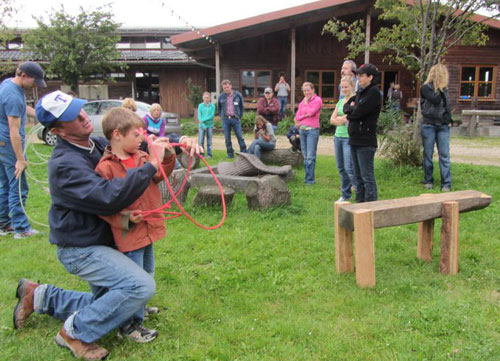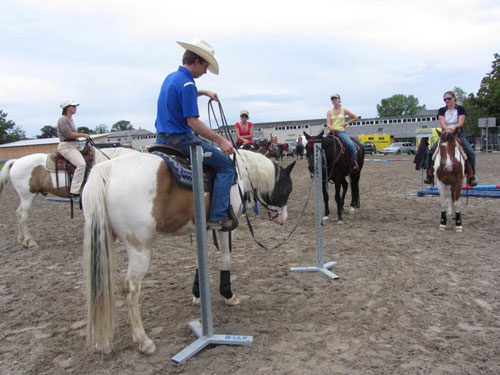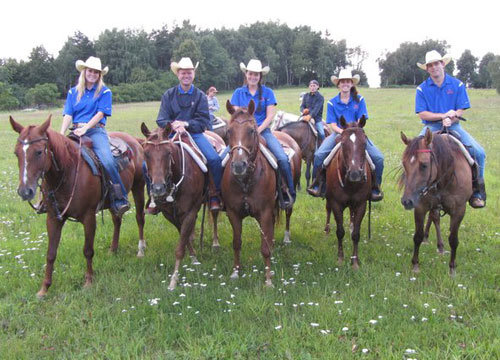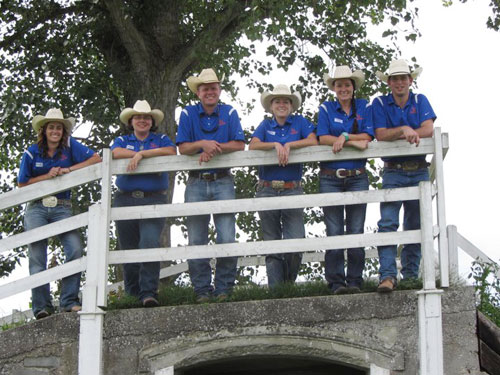Graduate Students 'Horse' Around Overseas, Teach Europeans The Joy Of Riding
May 4, 2012
SHSU Media Contact: Jennifer Gauntt
Story by: Amy Barnett
 |
| Agricultural sciences students and faculty members, including (bottom row, from left) Jessica Hawley, Lauren Pickle, Samantha Brooks, Matt McMillan, Sabrina Borgstede, and Caleb Thompson pose with clinic participants in the Czech Republic last summer. —All photos submitted |
When Matt McMillan and his graduate students put on their cowboy hats and slip into their boots, don’t think for a second it’s just for show. Every speck of dirt on their Stetsons, mud on their heels and sweat on their brows is proudly earned; and their hard work is not going unnoticed.
For the second year, the American Quarter Horse Association has asked McMillan to put together a team of agricultural science graduate students to travel abroad this summer to conduct horsemanship clinics in Switzerland, Germany and Italy.
 |
| (Above) McMillan teaches a young cowboy how to swing a rope during a demonstration. (Below) Thompson demonstrates how to properly close a gate in a trail pattern. |
 |
McMillan also applied for the opportunity last year and was awarded the grant, allowing him and three students to take their vast knowledge of horses and western riding overseas. In 2011, McMillan’s team conducted three- or four-day clinics in England, Germany, Switzerland and the Czech Republic.
“We provide a clinic for people who own horses and want to know how to ride, communicate, get along and have a good time with that horse,” said McMillan, assistant professor of animal science.
It sounds simple, but McMillan knew the group would face numerous challenges, mainly due to cultural differences and language barriers, so he picked his team carefully.
He made a phone call to Jessica Hawley who was working on a ranch in Centerville, loping for a cutting horse trainer.
“I was the one on the ranch who had to do all the work for the trainer. I saddled all of the horses, got on them when they were cold and fresh and wanted to run and warmed them up so when the trainer got on them, they were ready to work,” Hawley said.
Hawley, who wasn’t yet working on her master’s degree, decided teaching others about horses was a great opportunity to further her own education, so she started graduate school on a plane to England.
“The American Quarter Horse Association sent an intern with us to act as a liaison, but conducting the clinics was solely up to us. They basically said ‘here’s your plane ticket; someone will pick you up; you’ll work for four days then move on to the next country,’” McMillan said.
McMillan teamed up with graduate student Samantha Brooks to work with participants in each country who had at least a little knowledge and experience on horseback; Hawley paired up with fellow graduate student Lauren Pickle to work with the most novice of participants.
“You have an idea of what you want to accomplish and safety is always the first goal,” Hawley said. “Then you have to assess the horses’ abilities and endurance to determine if the horses have the stamina to be ridden eight hours every day for three days. Once you get to that point, you can determine what you can feasibly accomplish.”
The team found different scenarios in each country.
“England was very much like here in Texas; they had fast horses,” Hawley said. “They were very much beginners in the Czech; in Switzerland, even the beginners were further advanced.”
 |
| Brooks (right), with a participant and her first place horse show ribbons. |
“The Germans were the most demanding,” Brooks added. “They wanted criticism and didn’t want you to sugar-coat anything.”
She went on to say, “I just love the idea of furthering somebody’s passion, because we were all beginners at some point, and what a great experience to get to step out of your comfort zone and country and do that somewhere else.”
While out of their comfort zone, they also experienced cultural obstacles, such as adapting to hotels that didn’t have driers for their clothes.
“We had wet clothes hanging everywhere in our rooms. Sometimes we had to pack them wet and head to the next clinic,” said Hawley. “But at least the first clinic was in England where we spoke the same language.”
“Even though they didn’t always understand our East Texas dialect,” added a laughing Pickle, who has spent the past 10 years instructing horseback riding in a barn in Conroe.
“It’s an opportunity of a lifetime,” she said. “I never intended to go to graduate school until Dr. McMillan approached me about going to Europe. I was in the basic horsemanship course at Sam Houston and I really enjoyed the equine program; it was my minor.”
It didn’t take her long to decide she had made the right decision to help teach horse owners in other countries how to ride their horses.
“One of the greatest things is when you see riders who progress, and even if they don’t speak the same language as you do, you can see how excited they are to make progress with their horse,” Pickle said.
At the end of each clinic, McMillan and his students would conduct a horse show and give participants ribbons and certificates of course completion.
“There were a couple of people who had decided to never show again, but one participant came up to me afterward and said, ‘I really feel that after this clinic I have the confidence to show again, and this makes me happy again,’” Pickle said.
Others admitted when they saw the SHSU team for the first time in the arena, they were intimidated.
“That’s just part of the first impression,” McMillan said. “We looked professional, like we knew what we were doing, and we did.”
 |
| (Above, from left) Hawley, McMillan, Pickle, Brooks and Thompson take a trail ride in the Czech Republic countryside. (Below, from left) Brooks, Borgstede, McMillan, Hawley, Pickle and Thompson in Switzerland. |
 |
“I felt very fortunate to go on the trip last year because we all knew each other already. We had worked with each other before and had ridden together on the competitive ranch horse team, so we knew how each other worked. We knew each other’s strong suit and where one of us may be a little weaker the other excelled,” Brooks said. “I don’t think we could have picked a better group last year.”
McMillan agrees, saying that he has so much faith in these graduate students that this summer he’s staying behind in Huntsville and sending his students to Europe alone.
“I started the horse program at Sam Houston six years ago. I’ve developed new courses and curriculum to create the equine science minor. We’ve traveled all across the country and now outside of the country,” he said. “I’m very selective in who I would allow to go on these trips because I expect us to be the very best. If I don’t feel someone could do it, I won’t send them.”
There are now nearly 70 equine science minors at Sam Houston, with almost 50 students currently enrolled in the introduction to equine science course.
While Hawley and Pickle have another year before earning a master’s degree in agricultural science, Brooks will graduate in August and will begin veterinary school in the fall.
But first, these three and a fellow graduate student will travel overseas again, offering their knowledge to others, hoping to teach them and their horses how to communicate and enjoy the ride.
- END -
This page maintained by SHSU's Communications Office
Associate Director: Julia May
Manager: Jennifer Gauntt
Located in the 115 Administration Building
Telephone: 936.294.1836; Fax: 936.294.1834
Please send comments, corrections, news tips to Today@Sam.edu.

 SamWeb
SamWeb My Sam
My Sam E-mail
E-mail

